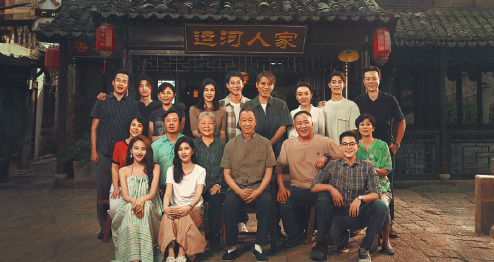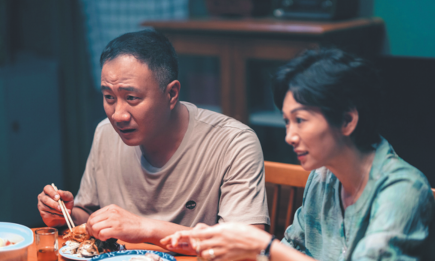Grand Canal stars in hit TV show
Adapted from prizewinning novel, series zooms in on those whose lives are influenced by the legendary waterway, Xu Fan reports.

More than 700 years ago, Italian merchant and explorer Marco Polo trekked to China, leaving a deep impression of the Grand Canal — the country's major waterway artery — and providing the detailed portrayal in the famous book, The Travels of Marco Polo, that stirred Europeans' curiosity about the Eastern world.
This also became the inspiration for writer Xu Zechen's best-selling novel Northward, which won the 10th Mao Dun Literature Award thanks to its epic recounting of the canal and riverside people over a turbulent span of more than one century.
In the novel, an Italian explorer who regards Polo as his idol ventures to China during the late Qing Dynasty (1644-1911) to search for his missing younger brother, embarking on a fate-intertwining journey with several Chinese individuals. Narrated in two parallel lines that switch between ancient and modern times, the skillfully structured tale also recounts the stories of their descendants.
For director Yao Xiaofeng, a native of Jiangsu province — where 687 kilometers of the canal flow through eight cities — the novel captivated him in 2018. The veteran had previously spent years searching for a proper story about the water and people residing along its banks.
With award-winning scriptwriter Zhao Dongling on board to pen the tale, the novel was adapted into a 38-episode, eponymous TV series that began airing on China Central Television's CCTV-1 and streaming site iQiyi earlier last month.
Starring actress Bai Lu and actor Ou Hao, the series — which is set between 2000 and 2014 — has attracted audiences, as evidenced by its related topics garnering 2.26 billion views on the social platform Weibo.
Centering on six neighboring families residing near one section of the canal in Huai'an, Jiangsu province, the drama chronicles their ups and downs, following their children as they move to Beijing to seek education or startup opportunities, riding the wave of the country's unprecedented internet business expansion.
"It's like a destined encounter that led me to helm this drama. The canal was part of my childhood memories. I was a self-taught swimmer, and many of the mischievous acts by the children in the drama are inspired by my own experiences," Yao told China Daily during a telephone interview.
In 2014, the Grand Canal was inscribed on UNESCO's World Heritage List, inspiring Yao to read several books and watch documentaries about the world's longest artificial waterway.
Delving deeper into Xu's canal-centered novels, such as Stories of Beijing Western Suburbs and Jerusalem, Yao gained a profound understanding of how the canal — which stretches nearly 3,200 km and flows through 35 cities — serves as an economic and cultural artery for the country, influencing the livelihoods of numerous local residents.
Captivated by the spiritual core of Xu's tales, which depict themes of homesickness and destiny, Yao, alongside major creators, including screenwriter Zhao and chief producer Zhang Shuwei, took a road trip along the section of the canal in Jiangsu province. They collected firsthand information by interviewing nearly 100 boatmen who live and work on barges.
"The journey took around half a month. Many boatmen's families, consisting of parents and one or two children, live, sleep, and entertain themselves on their boats. They rarely go ashore, unless they need to purchase daily necessities from supermarkets," Yao recalls.
However, what has touched Yao the most is the boatmen who had to leave the water due to the fishing ban in certain sections to protect the local ecosystem. "On the boat, they are like fish in water. But when they are relocated to life on land, you can sense their deep sense of loss, even though their new life is more comfortable and stable," Yao remarks.
Having to leave the environment they know best due to societal changes, many boatmen struggle with feelings of uselessness and a loss of confidence. These experiences inspired the character played by actor Hu Jun — a once-successful barge operator who faces a personal crisis after the decline of his water transportation business.
Zhang, the chief producer, tells China Daily that she also feels impressed by how boatmen take the boats as their "moving houses".
"The core of their lives revolves around boats, and when they discuss buying a boat, the gravity is akin to how we city dwellers talk about buying an apartment," says Zhang.
During their survey journey through cities such as Huai'an and Yangzhou, Zhao recalls meeting young people who had graduated from foreign colleges and returned to their hometowns to start small businesses, such as opening bookstores.
"We heard many interesting stories and incorporated some of their elements into the drama," Zhang adds.
The series' major scenes are set in Huajie (Flower Street), a riverside community home to 18 characters from six families. To find the perfect filming location, the crew surveyed multiple sites before selecting Bacheng Old Street in Kunshan — a 200-meter-long, narrow street lined with densely packed, gray-tiled houses.
"Although filming on a sound-stage makes it easier to control lighting and the surrounding environment — such as avoiding onlookers — we chose to embrace the challenges of shooting on location and built the characters' homes directly on the street," says Zhang.
This also makes the filming feel more authentic, and full of everyday life. In some long takes, the scenes capture lively children joyfully running from their own courtyards to their neighbors', a bustling wonton stall opening for breakfast and residents sitting on small stools, enjoying their morning meals.
Interestingly, the construction work was kept on to ensure that the props and room decorations updated according to economic and societal development of the times, especially as local families' lives improved following the canal's successful bid for UNESCO's list, which has boosted local tourism and cultural businesses, according to Zhang.
The drama also explores the theme of root-seeking, according to the director.
Ma Siyi, one of six children living in Huajie, is a descendant of the Italian explorer's brother and his Chinese wife. After years of struggling with her appearance and background, she embarks on a journey to Italy in one episode to trace her roots. Raised by her Chinese grandmother after losing her father at a young age, her story highlights the quest for identity.
Similarly, in the final episodes, her five close friends, who mostly move to Beijing after growing up, return to their hometown, symbolizing their own journeys to reconnect with their roots.
"It has been a timeless literary theme revolving around 'who I am' and 'where I come from'. Until the end of the drama, the audience will see how all the characters' fates are bound to their ancestors from over 100 years ago," says Yao.
"Personally, this is the most captivating part of the tale and the reason it has drawn me to adapt it into a TV drama," he adds.






Today's Top News
- Shanghai jumps to beat of electronic music festival
- Outcomes of COP30 show multilateralism is alive despite headwinds
- 'No room for compromise' on sovereignty, FM says
- Battery tech progress to power EV sector's future
- G20 called on to firmly uphold free trade
- China's well-being assistance crucial for many: China Daily editorial






























